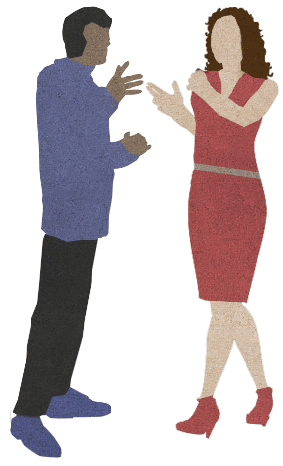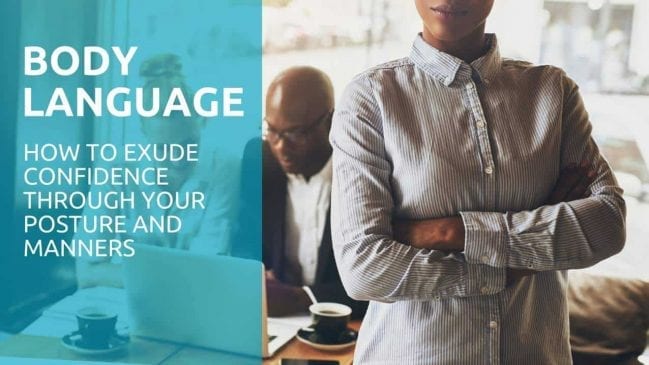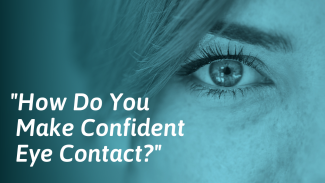“I want to learn how to get a more confident body language. I don’t know how to stand when I’m talking to someone, or how to fit, it what gestures to use.”
Your body language makes up 55% of your total communication.[1] No matter what words we use, our body language is what determines if we come off as confident. So how do you get a confident body language?
Maintain a good posture with your chest up and your gaze horizontal. Avoid being too rigid in your body or crossing or hiding your arms. Be comfortable with taking up space and being in the center of the room. Maintain eye contact and avoid fiddling with your hands. Face people directly.
In the following steps, we’ll go through how to do this in practice.
Sections
Getting a confident body language
1. Maintain a confident posture
To get a confident posture, hold your head horizontal and stand up straight, like if you had an invisible thread running through your spine and head, lifting you up. Let your chest move slightly forward and up as a result of this thread. Make sure that your chin is pointing slightly downward.
Hunching over, keeping your head down, crossing your arms, and folding into yourself can be signs of fear, shame, or insecurity. Take note of how you hold yourself when you are nervous or uncomfortable, and make an effort to stand normally in these situations instead. It can be helpful to ask close family or friends who have spent a lot of time with you what they notice about your behavior in these situations so that you can be more aware of it in the future.
This video explains how you can strengthen your upper back so that you don’t slouch even when you don’t pay attention to your posture.
2. Practice moving around
In addition to having a relaxed, open posture, confident people are comfortable moving around. Make sure you understand the difference between “moving around” and fidgeting– nervous tics such as messing with your hair, pacing, twisting an earring, 0r fiddling with a lanyard or the buttons on your shirt are not indicators of confidence. Stiffness, such as keeping your hands clenched tightly in fists or shoved deep into your pocket, indicates discomfort.
When watching someone giving a speech, it is clear they are nervous if they clutch the podium or their notes and rarely let go. Confident body language includes the use of hand gestures, animated facial expressions, and other natural movements that are appropriate for the situation at hand.
3. Be relaxed in your body and not too rigid
Although you might expect a confident posture to consist of a ramrod-straight back and arms held to either side, this sort of rigid position can appear uptight.
On the other hand, slouching, keeping your head down, and crossing your arms are each a means of making yourself look smaller, which indicates timidity, fear, and insecurity.
While it’s true that you should stand up straight, that doesn’t mean to stand uncomfortably straight. If it feels unnatural, it probably looks unnatural too. Visualize your spine as the backbone that helps you keep a good posture. Your other body parts, like shoulders and arms, are hanging comfortably and relaxed from this backbone.
4. Let your hands show
Keep your hands free and visible.
If your hands are shoved deep into your pockets, you can come off as uncomfortable and people will be wary of you– if you’re uncomfortable, there’s probably a reason… so maybe they should feel uncomfortable too.
It’s also important to pay attention to the nervous habits you may conduct with your hands.
Many people unwittingly mess with their hair, pick at their fingernails, or fiddle with their clothing or accessories when they get nervous. You may not realize you’re doing it, but other people will, and your insecurity will become transparent.
5. Walk decisively
The way that you walk can indicate how self-confident you feel.
Walking with small steps, walking indecisively or walking faster than others, can come off as insecure.
Taking larger strides and keeping your eyes fixed on your destination, rather than on the floor, can indicate that you are confident both in yourself and in what you’re doing and can give you the appearance of walking with purpose.
6. Be comfortable with taking up space

Taking up more space by standing with feet shoulder-width apart or sitting with your feet planted firmly on the ground is an indicator of confidence. By doing this, you are showing that you know where you belong and you’re not afraid to be seen or to make yourself comfortable in your space.
Don’t over-do it. Maintaining a comfortable stance that takes up an appropriate amount of space for your body size will make you appear much more confident than you will if you stand as though you’re in an overly-full elevator.
Say that you’re at someone’s house, in an unknown environment with people you don’t know.
You probably feel stiff and suddenly it feels like you forgot how to even sit in a way that wouldn’t make people think you’re weird.
Think back on how you would sit if it would be on your own sofa together with your best friend, and attend that pose. (Within the social rules of the situation you happen to be in).
It’s probably more relaxed; leaning backward, taking up more space with your arms and legs.
Use this “my own sofa” position whenever you feel tense when sitting.
7. Maintain eye contact
Avoiding eye contact can signal insecurity or social anxiety.[2] However, eye contact can be over-done. If you feel uncomfortable making eye contact, you can focus on other’s eyebrows or the corners of their eyes. Read our eye-contact guide here.
8. Control your facial expressions
For some, facial expressions can be the most difficult aspect of body language to control. It can be easy to reveal exactly what you are thinking and feeling on your face. But with practice, you can learn to maintain facial expressions that exhibit confidence regardless of the situation.
First, confident people smile because they believe in their ability to handle any situation, and their lack of insecurity allows them to enjoy themselves. When you are nervous or uncomfortable, you smile less frequently, if at all. Making sure to smile (when appropriate) will give you the appearance of confidence.
Some things a confident person doesn’t do include:
- Pursing his lips
- Biting his lip
- Blinking rapidly or unnaturally
- Clenching her jaw
Think about which of these things you find yourself doing when feeling nervous and focus on maintaining a neutral facial expression instead, and be sure to smile when appropriate.
The most confident people you know are probably not as confident as they seem. Most successful people have discovered the truth in the saying “Fake it ’til you make it.” Learning how to use your body language to convey confidence–even when you aren’t feeling it– will allow you to develop actual confidence as you continue to experience success.
9. Direct your feet toward the one you’re talking to

If a group of people are having a conversation, they will point their feet towards the person they are attracted to or towards the person who they see as the leader of the group. If someone wants to get away from the conversation, their feet are pointed away from the group or towards the exit.
I have a friend who’s exceptionally good at connecting with people. One of the reasons for this is his ability to direct his full attention to the person he’s talking to. You never get the feeling that he has to go somewhere (unless he has to), and that makes him rewarding to talk to.
If you’re in a situation where it’s not explicitly meant to socialize, say that you start talking to your neighbor in the hallway, it can be a good idea to not instantly point your body straight towards him or her as it can feel too invasive. However, say that you want to create a close connection with your neighbor, make sure to give him or her your full focus after a minute or so.
To really connect with someone, make that person feel like you have time for him or her and aren’t on your way somewhere else.
Often when we feel a bit uncomfortable talking to someone – perhaps because we don’t know what to say next – we want to get away from the conversation. The other person might mistake that for you not wanting to talk.
Signal that you are interested in continuing the conversation by pointing your feet towards the person.
On the opposite – if you want to end the conversation with someone, pointing away from the conversation and angling your body away will signal that you are about to take off.
10. Mirror the one you’re talking to
Outgoing people don’t only show that they enjoy the moment. They are also great at mirroring the person they are talking to.
Mirroring is when you in a non-obvious way behave like the person you’re talking to.
Everyone is doing this subconsciously – more or less. Without even thinking about it, you speak with different jargon and speed to say, your grandma, than with your friends.
To get a sense of how mirroring can be the deal-breaker when it comes to making friends, let me tell you a story about a guy I know who no one really wanted to hang out with, simply because he always spoke very fast and with higher energy than anyone else.
This lack of mirroring affected his entire life – he couldn’t connect with people.
As he after a while became aware of this and started to adjust his energy, it was like his social life just switched on in just a few weeks – it became fun to hang out with him.
Mirroring affects not only the social energy level but also your general appearance. If you want to connect with someone, act more like that person.
Mirror the…
- Position the other person is standing in or sitting in.
- Jargon; the level of advanced terms, foul language, jokes.
- Social energy level; Talking speed, voice level, general energy level.
- Type of discussion; If someone’s talking about the meaning of life it’s weird to start talking about everyday matters and vice versa.
Naturally, you shouldn’t compromise who you are and only mirror what you’re comfortable with.
Common body language mistakes

Often when we feel uncomfortable in social situations, our body language is affected in the following ways:
We might…
- Cross our arms like we want to protect ourselves
- Body rock
- Hunch forward
- Act like we want to leave the conversation
- Feel afraid to take up space
- Sit or stand in a stiff position
- Start fiddling with our phone
Doing this makes us look nervous and shy. Even more importantly: It makes us feel nervous and shy. That’s right. Like I mentioned in the previous chapter, nervous body language, such as nervous laughter, can cause you to feel more nervous.
If you physically change your body language, your brain will produce hormones that will indeed make you feel more confident.
1. Crossing your arms
People who cross their arms come off as nervous or skeptical. Avoid doing this when you’re talking to someone. Also avoid to “protect your belly” by holding a hand in front of it or holding something you carry in front of it. That’s a clear sign of being uncomfortable
What to do instead:
Let your arms hang relaxed along with your sides.
If you’re holding a glass or a phone or a bag, hold it at waist level with relaxed arms along your sides.
A great habit is to simply put your thumbs in your pockets and let your fingers point downward when you’re talking to someone. That will create a natural, relaxed look.
2. Body rocking
Reporters who are out on the field are taught in journalism class to “anchor” themselves in the ground in front of the camera to convey more confidence and to avoid moving around too much.
If you feel uncertain of where to stand and it feels like everyone is looking at you, throw a mental anchor right where you are and stand still on the spot with your feet at shoulder width.
It can be comforting to know that when you don’t know where to go or what to do, instead of flinching around, just encamp where you currently stand until you know where you’re going next. That will make you look confident and relaxed.
3. Hunching forward
As proved in studies, hunching forward increases cortisol levels in your blood which will make you stressed. It also makes you look submissive and nervous, so try to avoid it.
In a study, test subjects were asked to guess who was the leader of different work teams. It turned out that they didn’t pick the actual leader, but most often chose one of the groups with the best posture. A good posture automatically signals that you’re confident and it makes you more attractive.
People often make the mistake of leaning backward when they try to improve their posture. Avoid doing that and instead, use the technique below.
Turning nervousness into confidence
An outgoing body language is about looking and feeling comfortable, mirroring the person you’re talking to, and showing that you’re into the conversation when you’re talking to someone.
Here’s a great exercise that I used to do a lot.
It’s said that if you are afraid of the dark, the best way to conquer the fear is to stand still in a dark room for a long time. Being scared is energy consuming, and after a while, your body simply won’t have the energy to feel scared anymore. Well, in this exercise we are going to use the same principle but for social situations instead.
Say that you’re in one of those situations where there are people around you and you don’t know what to do, so you pick your phone up just to look busy.
- Next time, instead of picking your phone up, enter a relaxed position like the “my own sofa” position. Or, if you’re standing up, just put your thumbs down your pockets, fingers pointing downwards.
- Actively lower your stress levels by breathing slowly and paying attention to each breath.
- You will after just a minute notice how you are in charge of how you feel – you will experience how you are the one who decides if you want to feel comfortable.
- You will also notice how, as long as you look confident, you don’t need to talk to someone or do something with your phone.
For me, this was a paradigm shift.
I started to enjoy feeling relaxed in environments that I know most people think are stressful. It was a relief for me to just stand and feel relaxed in intense social situations: “Nah, screw this nervosity thing. I’m gonna choose to sit here and enjoy it instead.”
Click here if you want to see my review of the 11 best books on body language.










Absolute bs. Tips like these are trying to fake something that can not be faked. Posture is only one thing, there is eye movement, facial expression, tone of voice, use of words and a zillion other. If you want to control all of these, first of all you’d be trying to break important neural connections between your body and mind, secondly, you’d have ZERO remained attention to actually focus on the present moment.
Want confidence? Do the thing you fear and not read articles like this.
Thank you for the excellent advice. I am going to practice until I feel confident in my own skin. Two questions for you:
I almost always look people in the eyes during conversation but I notice about 95% of the time it’s not reciprocated. Why is that? Surely not all are anxious or shy.
Second question, it really bugs me when I ask someone a question and they turn to everyone else but me to answer….why??
It’s interesting that a posture for confidence allows for movement. I’ve been told by family and friends that my posture isn’t the best. My goal for this new year is to change that and have a confident posture moving forward. I’ll be sure to use these tips to help with this goal that I have.
Thanks. Hmm!
Hi Jean! It sounds like you’re on the right track with paying attention to your body language and practicing in the mirror to develop a body language that’s sending the signals you want.
It also sounds like you’re right about the way you sit on the train– this sort of body language is likely indicating to people that you don’t want to be bothered. Have you considered angling your body towards the aisle or more towards the person beside you, instead of straight ahead? This will make you more approachable to people who may wish to initiate conversations as well as put you in a position to make eye contact with people who you may wish to talk with.
Also, if there’s a safe place for you to sit your things (other than keeping them in your lap), I would recommend you do so. Having a lot of things with you will cause you to appear busy or preoccupied, and make you appear less open to interacting with people.
Taking note of the way you sit when you’re around people you’re comfortable with and mimicking some of those postures and behaviors will help you a lot as well 🙂